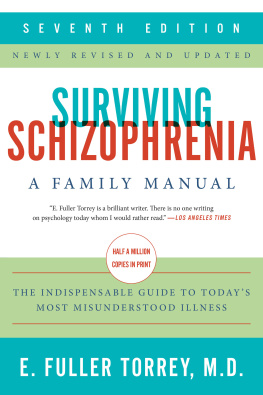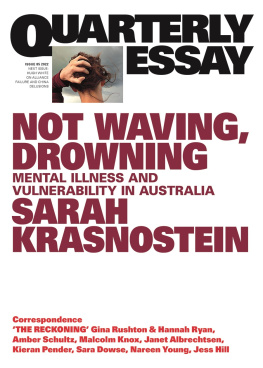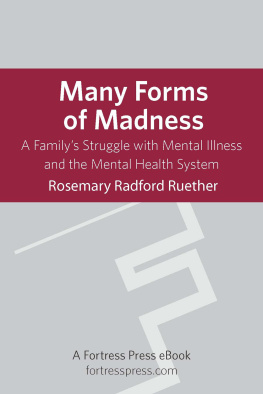American Psychosis
American Psychosis
How the Federal Government Destroyed
the Mental Illness Treatment System
E. Fuller Torrey, MD


Oxford University Press is a department of the University of Oxford.
It furthers the Universitys objective of excellence in research, scholarship,
and education by publishing worldwide.
Oxford New York
Auckland Cape Town Dar es Salaam Hong Kong Karachi
Kuala Lumpur Madrid Melbourne Mexico City Nairobi
New Delhi Shanghai Taipei Toronto
With offices in
Argentina Austria Brazil Chile Czech Republic France Greece
Guatemala Hungary Italy Japan Poland Portugal Singapore
South Korea Switzerland Thailand Turkey Ukraine Vietnam
Oxford is a registered trademark of Oxford University Press
in the UK and certain other countries.
Published in the United States of America by
Oxford University Press
198 Madison Avenue, New York, NY 10016
E. Fuller Torrey 2014
All rights reserved. No part of this publication may be reproduced, stored in a
retrieval system, or transmitted, in any form or by any means, without the prior
permission in writing of Oxford University Press, or as expressly permitted by law,
by license, or under terms agreed with the appropriate reproduction rights organization.
Inquiries concerning reproduction outside the scope of the above should be sent to the Rights
Department, Oxford University Press, at the address above.
You must not circulate this work in any other form
and you must impose this same condition on any acquirer.
Library of Congress Cataloging-in-Publication Data
Torrey, E. Fuller (Edwin Fuller), 1937
American psychosis : how the federal government destroyed the mental illness treatment system /
E. Fuller Torrey, MD.
pages cm
Includes bibliographical references and index.
ISBN 9780199988716
1. Mentally illCareUnited StatesHistory. 2. Mentally illServices forUnited
States. 3. Mental health policyUnited States. 4. Mental health servicesUnited
StatesEvaluation. I. Title.
RC443.T66 2014
362.1968900973dc23
2013017565
1 3 5 7 9 8 6 4 2
Printed in the United States of America
on acid-free paper
For the ineffable women of my life
Barbara, Martha, Torrey, and Olivia
All royalties have been assigned to the Treatment Advocacy Center in Arlington, Virginia.
CONTENTS
I dont know why other people write books, but for me, it is a selfish enterprise. I write to answer questions that are bothering me. For many years I have been appalled to watch the unfolding disaster of services for people with serious mental illnesses. The fact that my sister suffered from severe schizophrenia has certainly accounted for part of my interest. Year after year, I observed the consequences as public mental hospitals were being emptied. It was like watching the effects of a tsunami or a Category 5 hurricane in slow motion; although I knew what would happen next, I have re-run the tape in my mind, again and again.
I worked at the National Institute of Mental Health (NIMH) from 1970 to 1976, in the midst of the events described herein. Bertram Brown, then NIMH director, was my supervisor. Although I had no formal responsibilities for the federal community mental health centers program, I interested myself in it and visited some centers. Thus, I personally was acquainted with many of the players who were responsible for the program. With few exceptions, these people were intelligent, public-spirited, well-meaning, and dedicated individuals. That fact elicited the question that bothered me: How could so many well-meaning professionals have been so wrong and been complicit in creating such a disaster? This book attempts to answer that question.
I do not pretend to be a dispassionate observer. During my years of working in a public psychiatric hospital, I observed with increasing anger the effects on my patients of inadequate community services. I continue to become choleric when I read accounts like that of Charles Furry, diagnosed with schizophrenia and Lou Gehrigs disease, living by himself in suburban Virginia and dependent on Medicaid-funded home health aides:
When we removed his socks maggots fell out. Hundreds fell out initially. There were some between his toes and under his skin. Furrys legs were swollen and his shirt was drenched in drool.
This is not what President Kennedy had in mind 50 years ago when he promised that for people like Mr. Furry reliance on the cold mercy of custodial isolation will be supplanted by the open warmth of community concern and capability.highly profitable private company. We should not allow human beings to be treated in this manner if we claim to be truly civilized.
Having lived in the nations capital for most of my adult life, I have also been intrigued by the federal angle to this story. Here is a case study of a federal policy that went astray. In most such cases, there is a course correction. Yet in this case, there has been none, even now, a half-century later. Why is that? Each day after work, thousands of government workers gather over drinks to discuss their Grand Idea for solving one national problem or another. Like Robert Felix, the first director of the NIMH, they wait for the stars to align and the approval of their supervisors to implement their Grand Idea. This is thus also a cautionary tale.
If we are to correct our errors, then it is necessary to understand how we got where we are. We have made many mistakes in how we care for the most vulnerable among us and, alarmingly, other countries such as Canada and Britain are following us down this path. What can we learn from the past?
This book would not have been possible without the generous donation of many peoples time. Special thanks go to Bertram S. Brown, who unhesitatingly shared his ideas and memories for a book that he knew would not be flattering, and to Henry Foley, who retrieved his valuable 1972 interview tapes from his garage shelf and generously shared them. Others who kindly responded to my inquiries include Robert Atwell, Jerry Dincin, Matthew Dumont, Sister Ann Dyer, Rashi Fein, Mary Herbert, Robert Keisling, Anthony Lehman, Bentson McFarland, Frank Ochberg, Lucy Ozarin, Anthony Panzetta, Roger Peele, Steven Sharfstein, Alan Stone, John Talbott, and Claudwell Thomas. Archivists and librarians are a writers best friends and I am specifically indebted to Tracy Holt at NIMH; Doug Atkins at the National Library of Medicine; Gary McMillan at the American Psychiatric Association; Amy Lutzke at the Fort Atkinson Public Library; and Eric Robinson at the New York Historical Society.
Faith Dickerson, Doris Fuller, Jeffrey Geller, Stephen Hersh, D. J. Jaffe, and Robert Taylor read portions of the text and contributed valuable comments. My best reader, as always, was Barbara Torrey, who contributed not only suggestions but everything else that makes writing a book possible. Sarah Harrington and Andrea Zekus at Oxford University Press made the revisions and publication of this book hassle-free, and it has been a great pleasure to work with them. Melissa Bolla is an excellent research assistant, and Judy Miller provided invaluable editorial and administrative assistance once again.
In addition to the above, I gratefully acknowledge the following:
Chloe Raub, Special Collections Research Center, George Washington University, for permission to use the picture of Dr. Walter Freeman
Next page













